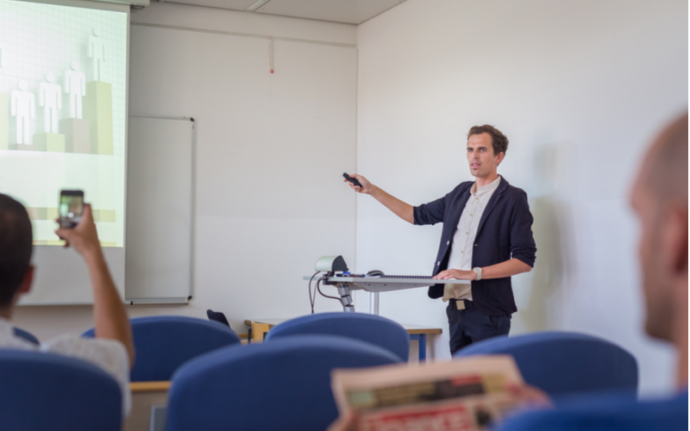The concept of a supervisor
Supervisor – an experienced teacher, a teacher of the department to which the graduate student is attached, writing a thesis under their supervision. Their task is to guide the writing of the work in the right direction, to suggest an algorithm.
According to the WritingAPaper researcher, a mentor is assigned to support the graduate student in writing a research Ph.D. thesis. Each university has its own approved regulation on the procedure for appointing a supervisor.
Requirements for the thesis supervisor

- Assigned from among the professorial staff.
- Has the title of professor or doctoral degree in the field in which the graduate student writes the thesis.
- Has research activities in the area of the Ph.D. student’s chosen field of study.
- Has published works related to the topic of the thesis.
- Participates in approbation of the results of their activities at conferences (including international).
- Supervises no more than 20 dissertations at a time.
Why do you need a mentor, and how to get the most out of it?
The effectiveness of your Ph.D. thesis preparation depends on the proper choice of mentor. A good supervisor will motivate their mentee and provide them with psychological support.
Functions of the supervisor
- help with the choice of the topic and drawing up a plan;
- advise where to find the necessary information;
- share experience in planning a research paper;
- advise on preparing for a defense;
- provide appropriate assistance throughout the process.
To get the most out of your meeting with a Mentor, you should prepare carefully for each consultation. Write out for yourself all the questions you are going to ask. Think in advance about what kind of help you need and what you can ask for. Then your meetings will be productive and will not take much time.
Main responsibilities

- Supervise the dissertation’s writing process (participate in drawing up an individual plan of preparation, recommend literature, and coordinate the content of each section).
- Monitor compliance with the deadlines of the individual training plan.
- Provide advice, guidance, and other necessary assistance.
- Keep the writing of scientific articles and the central part of the thesis under control.
- Organize and advise the research and experiments.
- Keep under control the passing of the compulsory practice of the candidate.
- Assist in preparation for the graduate student’s final examinations.
- Participate in their certification.
- Provide an opinion on the graduate student’s research work.
- Draw a review of the mentee’s scholarly work from an objective point of view.
- Prepare a written decision on the Dissertation Council’s consideration of the finished work.
- Find reviewers and opponents.
- Assist in preparing the candidate for the defense (help with answers to anticipated questions, check the prepared dissertation and opening statement).
The supervisor’s review of the thesis
In the review, the supervisor gives a general description of the candidate and his assessment of the research:
- indicates the period of study in doctoral studies and current progress;
- if available, mentions all available certificates, diplomas, and certificates received for mastering programs of additional professional education during this period;
- notes the merits of the mentee in professional activities;
- describes in general terms the problem solved by the dissertator in work, its content, and positive aspects;
- indicates the forms of approbation of the results of the candidate’s research activity and their presentation;
- evaluates the research conducted by the thesis candidate from the point of view of its compliance with the established requirements of the Higher Attestation Commission (HAC);
- analyzes the results of the defendant’s participation in the research of the university, faculty, and department;
- lists positive personal qualities of the mentee, their interest in the topic chosen for the thesis and research activity in general, creative approach to problem-solving, independence, and initiative.
Speech of the supervisor at the thesis defense

After the graduate student presents their scientific work and their response to questions, the thesis supervisor speaks. The supervisor characterizes the applicant as a candidate for the role of a scientist, tells about their attitude to the work on the dissertation, and assesses their personal qualities.
After that, the supervisor goes directly to the general evaluation of the applicant’s scientific work. The writers from the best writing services state that, at the same time, the supervisor’s goal should not be to pre-empt possible objections from the opponents; this should be done by the thesis candidate when defending their work.
The supervisor’s speech aims to give an objective assessment of the results of the research work conducted under their supervision and to substantiate why they consider it possible to recommend the dissertation for defense.
Defending a thesis without a supervisor
Is it possible to defend a thesis without a supervisor? Each dissertation candidate is mandatorily assigned a supervisor. Even if a graduate student conducts all research independently or formally, it is still considered that they write their dissertation under the guidance of an experienced mentor.
The thesis supervisor can be absent from the defense if there are good reasons for this. But in this case, they must provide the Academic Secretary of the Council with their thesis review to read aloud. In the case of a lethal outcome, another supervisor is appointed to represent the thesis candidate at the defense.
How the supervisor is assigned
The supervisor is appointed by the Vice-Rector for Science and Innovation no later than 3 months from the enrollment date in the graduate program. The following documents must be submitted for an appointment:
- Information for the last 3 years on the research work of the prospective supervisor.
- Statement of their consent to supervise the work of the specified graduate student.
- Extract from the protocol of the university academic council meeting on admission to the supervision of the thesis (if previously had no such experience) with a petition for the appointment of the specified instructor as an academic advisor.
- A petition from the applicant to appoint a specific faculty member as a supervisor.
Sometimes, the department decides whom to appoint as the thesis supervisor.
How to Choose a Supervisor

Choosing a mentor is a responsible step for a graduate student since you will have to communicate with them throughout the study and writing of the thesis.
Step 1. Decide on the topic of your Ph.D. thesis. It is easiest to continue and develop the topic started in the master’s thesis.
Step 2. Find out which faculties, departments, and research units train graduate students in the profile you are interested in. Familiarize yourself with the faculty, their research activities, and their supervised dissertation topics.
Step 3. Select a potential supervisor based on the information gathered.
Step 4. Contact them or the head of the department. Preferably do so in writing, detailing your research interests and requesting agreement to be your supervisor.
The perfect supervisor: what are they like?
The ideal mentor should perform the following functions:
- accompany and support the applicant in all stages of the preparation of the thesis, including its defense;
- maintain a cooperative, equal relationship with the mentee;
- not claim to be a co-author, but at the same time give all the necessary recommendations for writing the thesis;
- advise sufficiently on the chosen topic;
- adjust the research plan in a timely manner and modify tasks as required;
- coordinate with the graduate student on the proper design of the thesis;
- analyze the results of the research and summarize them.
On this basis, it is necessary from the very beginning, when entering graduate school, to take the choice of supervisor seriously. Even if you decide to have the best essay writing service to do your thesis, you still need a suitable supervisor who will help you better understand what you are doing.















